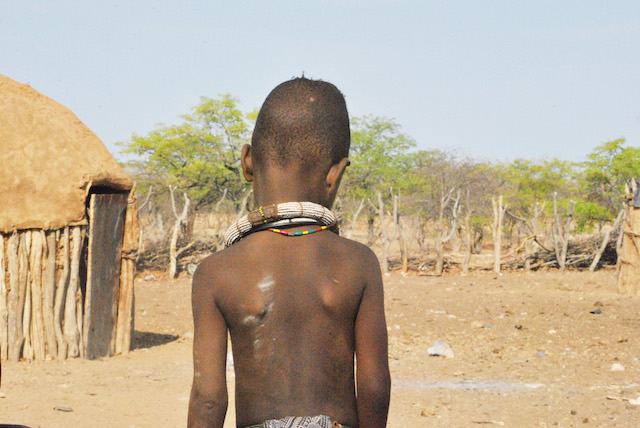
‘Married’ At The Age Of Two
Published on January 28, 2021 at 12:18 PM by Mc Noel Kasinja
LITTLE *Kengee Tjipo hardly knew how to walk and talk properly when her parents gave her hand in marriage to a 25-year-old man at the age of two.
Kengee, who is now four years old, is still too young to understand that she is already married and her family will be sending her off to her husband’s home once she turns six.
It is customary for Ovahimba families to arrange their daughters’ marriage at a young age and this family from Omuangete village in Kaokoland is no different.
According to her uncle, Kengee’s traditional ‘wedding ceremony’ took place at the village in 2018 and involved the slaughtering of a sheep, gifts to the bride’s family, while guests ate and drank to celebrate the union.
When The Namibian visited the family homestead recently, little Kengee was playing with other children in the dust, oblivious to what was happening in the adult world.
Kengee’s mother, *Tueripura Matundu, confirmed the marriage, saying the groom’s mother had asked for Kengee’s hand in marriage while she was still breast-feeding her.
“She [Kengee] was still being breastfed then and we accepted [the proposal],” she said, adding that Kengee’s mother-in-law is also her aunt, making Kengee and her husband cousins.
Even though Kengee is going to live with her husband from the age of six, Matundu strongly said she will not sleep in the same hut with him until she is old enough.
“Sometimes people ask my daughter [Kengee] about her husband and she starts to cry as if she understands,” recalls Tjiposa.
“Kengee will not be forced to sleep with her husband, if she does not want to,” Matundu says.
Matundu says she has no say on her daughter’s education, since she married her off and it is entirely up to her husband to decide what he wants for her.
“If a child does not want the marriage, she should not be forced because she might end up committing suicide,” Tjiposa advised.
Similarly, if the man is no longer interested in his young wife, he can leave her even after they have lived together for some time.
What the parents care about is giving the marriage a chance, and if one is not happy about it, they can leave their partner, Matundu said.
PASSED DOWN FROM GENERATIONS
There are many things that make the Ovahimba different from other Namibian tribes – their red ochre, known as ‘otjize’ and the many ancient practices they retain that have been abandoned in some countries – like arranged child marriages.
The Ovahimba are a unique, vibrant, industrious and nomadic tribe that religiously follow the traditions of their forefathers.
They are mainly found in north-western Kunene.
Loyalty to tradition is ingrained in their lives as they still practise child marriages.
When The Namibian visited the small village of Omuangete approximately 75 kilometres from Opuwo, headman Tjihenu Tjiposa explained the reason for child marriages.
“We marry the young ones with the hope that they would give us children, who will look after the livestock,” he said.
Tjiposa explained that choosing the bride is the prerogative of the groom’s parents who then initiate the negotiations.
It is up to the bride’s parents to accept or reject the proposal.
All along the groom will not know about the arrangements, only to be told after the negotiations succeed.
His parents tell him they have found him a bride and he cannot refuse or reject the arrangement. The betrothed bride can be anything between one and 14 years, or older.
After the bride’s parents accept the proposal, the bride continues staying in her father’s household while growing up, Tjiposa explained.
GIVEN NO CHOICE
When the time to take the child bride away comes, a traditional wedding is performed at her father’s house where a send-off feast is held and another one to welcome her at the groom’s house.
Tjiposa said a girl can be married off to older men with no specific age limit.
As the bride continues staying with her parents, the groom must build a home so that when she is old enough to go to her husband’s home, usually around the age of 14, they would already have a home to raise their children.
The headman said some girls reject this practice because they are not interested in the man or they feel they are too young to get married.
“If she doesn’t want the marriage, we persuade her to go back and try again, until she finds interest in him. If she does not find interest after we have insisted on her going back, we then accept her decision and she can return home,” Tjiposa explained.
He said the biggest sign of disrespect a child can give her parents is disobeying them, which is why it is hard to take no for an answer from their children on marriage.
Ovahimba marriages have their own warts.
Tjiposa says if a man fails to make his wife pregnant, she can secretly get another man and the community looks the other way.
Her husband becomes the father of the children, even if he knows they are not his. The biological father will never claim those children because he fathered them with someone’s wife.
An elderly woman, Katjiremua Tjikundi, opened up about child marriages among the Ovahimba.
She said she also got married young, although she could not remember her age then. All she knows is that she was married off to an older man and has lived with him since.
She says parents can tell a pregnant woman, usually a relative or someone they like that if she gives birth to a baby girl, they would want her for their son.
If the pregnant woman and her husband accept the proposal, and she gives birth to a girl, the groom’s parents send congratulatory gifts as they are now in-laws.
If both sides agree to perform the marriage ceremony while the bride is still a toddler as in the case of Kengee, her mother wears the traditional wedding attire on behalf of her daughter.
And if a young bride rejects her father’s marriage offer, he disowns her.
Another child bride, *Karii Tjitemba, got married when she was 11 and went to her husband at 14.
Tjitemba says she did not like marrying an older man, but her parents talked her into giving it a chance, and she gave in.
A girl starts sleeping with her husband at 16 years after she has her first period. Even if she reaches the age to engage in sexual intercourse, she still has the right to say no, said Tjitemba.
RUNNING AWAY FROM HOME
* Rirua Tjimbingue (17) is one of the girls who rejected an arranged marriage by running away from home.
Tjimbingue does not know when she was married off, but the first time she was told she was married to a man in his 30s, she was 10 years old.
“I was shocked when I was told that I was married, and everyone at home told me it is our tradition,” Tjimbingue said, adding that when her parents told her to go to her husband’s home she refused.
“The man is big, he is older, which is why I decided not to live with him. I did not even love him,” she said.
When her parents heard of her rejection of the marriage, she says they tried forcing her to go but she refused.
Toromba then got fed up and fled to relatives at another village. Her parents looked for her in vain and she only returned when they stopped looking for her.
NOT WELL RESEARCHED
The regional councillor for Kunene, Weich Mupya, says he has known about child marriage since he was very young.
He, however, cannot remember when the last child marriage was arranged in his family.
“I heard that it is happening but I did not make any effort to find out if it is really happening,” Mupya said.
He said child marriage in the region has not been researched because it is not a matter of public interest and that people react to the outcry of the community for action to take place.
The councillor further claimed that the outcry over child marriages are foreign and not from the people of the region.
“Community members are not complaining about this thing, but if they start complaining, we will see how to solve it, if we know it is really a problem,” Mupya said.
Mupya said there is not enough evidence for the police to investigate the practice and that people should seek help from traditional authorities, the gender ministry or regional council and many organisations, on child marriages.
He advise people with knowledge on child marriage to speak up, so this issue can be tackled.
The investigator at the Ministry of Safety and Security’s Gender-Based Violence Protection Sub Division in Kunene region, Rebecca Thomas, said they are aware of child marriages among the Ovahimba, even if there has been no official report for the past three years she has been at the division.
According to Thomas, children are willing to report if they are married at a young age, but they fear getting their parents arrested.
Thomas said to curb this practice, people need to be educated.
“We have to go around the villages teaching the community about GBV, child marriages and the consequences of child marriages,” Thomas said.
According to the Ministry of Gender Equality, Poverty Eradication and Social Welfare National Formative Study on Child Marriage, child marriage is a global problem with more than one in every three girls getting married before the age of 15.
The report states that the legal age for marriage in Namibia is 18 years, and the main drivers of child marriage is poverty, culture and tradition, teenage pregnancy and lack of educational opportunities.
“From the NDHS 2013 data, the prevalence of child marriage among women in Namibia is 18,4%, while that for males was 4,1%. The highest prevalence of child marriage among women was reported in the Kavango regions (39,7%), while Kunene (24%), Zambezi (23,8%), Omaheke (23%) and Otjozondjupa (22,6%) also recorded high levels.
“The least prevalence was reported in the Oshana region (7%). There are more child marriages in rural areas (22%) than in urban areas (15%),” the report says.
The ministry plans eradicating child marriages by mobilising the community and conducting periodic countrywide education campaigns, enhancing children’s education particularly for the girl child.
The ministry also intends to strengthen the provision of social grants to poor and vulnerable people, including child state grants.
* Not their real names.
* This story was produced with funding from the Google Grant


